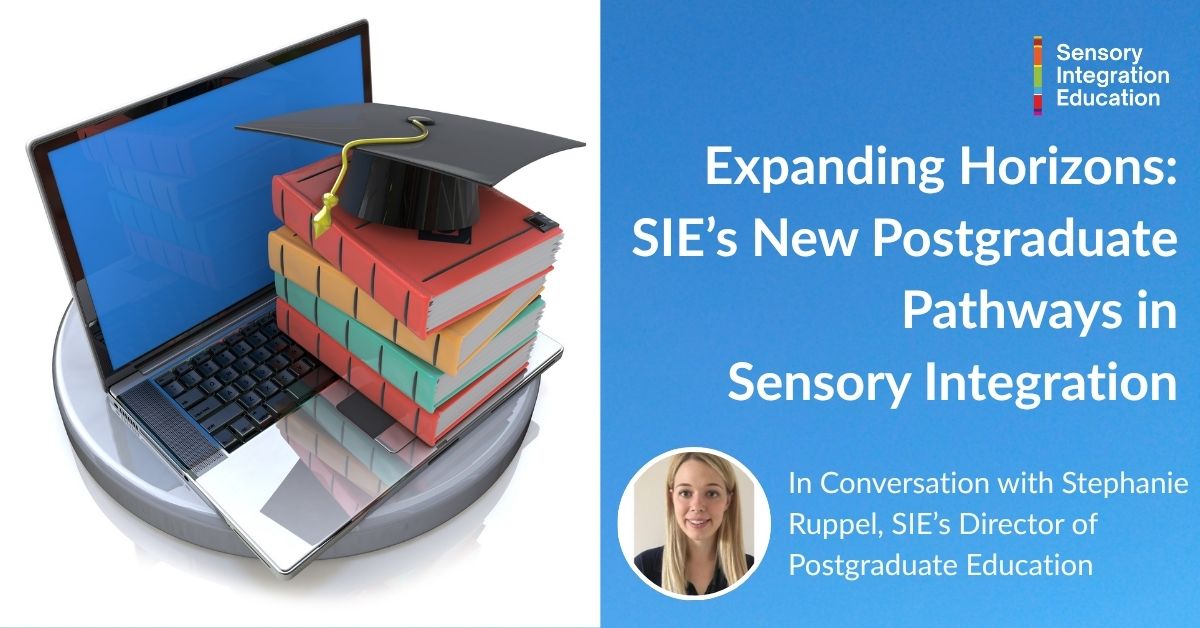Expanding Horizons: SIE’s New Postgraduate Pathways in Sensory Integration
By Sensory Integration Education, 27 October 2025

A Conversation with Stephanie Ruppel, Director of Postgraduate Education at Sensory Integration Education (SIE)
To unpack the exciting developments in SIE’s new postgraduate courses, we sat down for a chat with our Director of Postgraduate Education, Stephanie Ruppel, to learn more about how the updated pathways are opening doors for a wider range of health and social professionals to help them deepen their understanding of sensory integration and why now is the perfect time to join the growing community of SI Practitioners.
If you’ve ever found yourself fascinated by how our brains make sense of the world — or wondered why some people seem to find everyday sensations overwhelming or calming — then Sensory Integration (SI) might just be your next professional journey.
Q: Stephanie, SIE has recently updated the entry criteria for its postgraduate courses. What’s changed?
A: We’re really proud of this change! Traditionally, Sensory Integration training was most associated with Occupational Therapists, Physiotherapists, and Speech and Language Therapists. But we recognised that other professionals — such as Psychologists, Nurses, and Social Workers — share core skills and values that make them well placed to integrate SI theory into their work.
These are professionals who already assess, plan and deliver interventions that consider the person in their environment. They understand human development, behaviour, and participation. So, broadening our entry criteria just made sense. It’s about collaboration and making sure that the people who can benefit from an SI-informed approach have access to practitioners with a rich, multidisciplinary background.
Q: How can someone tell if this course is right for them?
A: Great question — and one we get a lot! This course is ideal if you’re working with individuals who might benefit from a sensory lens. It’s not about learning a set of ready-made strategies — it’s about really understanding sensory processing and using that framework to create meaningful change.
You’ll need access to individuals to practise your learning — because you’ll be assessing, hypothesising, and planning individualised interventions. It’s very hands-on and rooted in real-world practice.
You don’t need a specialist SI clinic to take part, either. We have students applying Ayres Sensory Integration (ASI) principles in schools, hospitals, community services, and mental health settings. What matters most is your ability to think critically and tailor interventions to the individual in front of you.
Q: For those not familiar, what are some of the key principles they’ll be learning about?
A: The course is grounded in Ayres Sensory Integration (ASI) — a well-established, evidence-based framework. You’ll learn about things such as establishing a therapeutic alliance, offering the ‘just-right challenge’ during activities, supporting adaptive responses, and maintaining a client-centred approach.
We want our learners to go beyond theory and think creatively about how to apply these principles in diverse settings and across the lifespan. Although much of the SI research comes from paediatric contexts, the foundations can be applied in mental health, social care, and adult rehabilitation too.
Q: What can students expect in terms of study commitment?
A: It’s a Masters-level course, so it’s academically rigorous — but it’s also designed with busy professionals in mind. The content is delivered asynchronously, which means you can fit it around work and personal commitments. We suggest setting aside at least half a day a week for coursework, with extra time for assignments and wider reading.
Each module includes a mix of theory, reflection, and practice-based learning. You’ll also have access to optional live sessions, discussion forums, and tutor support. Many of our students tell us they love how flexible it is — they can immediately apply what they’re learning in their clinical work.
Q: And when students complete the course, what will they be able to do?
A: Graduates of the PGCert in Sensory Integration will be able to evaluate sensory processing abilities, plan and deliver individualised interventions, and make informed, evidence-based decisions that support participation and wellbeing.
Those who go on to the PGDip will take those skills even further — integrating SI and sensory-informed approaches with other therapeutic frameworks, and developing a deeper, more reflective understanding of their practice.
Ultimately, it’s about empowering professionals to make a real difference. Whether that’s helping a child engage more confidently at school, or supporting an adult to manage sensory challenges in daily life, the impact can be transformative.
Q: Finally, some people wonder why these courses are limited to certain professionals — can you explain that?
A: Absolutely. Sensory Integration isn’t a stand-alone therapy — it’s one approach within a professional’s broader toolkit. Practitioners need a solid understanding of health, development, and behaviour to use SI safely and effectively.
That’s why we restrict entry to registered health and social care professionals. Their professional training ensures they can interpret sensory information within the bigger picture of a person’s wellbeing — avoiding misinterpretation or unrealistic expectations. It’s about ensuring that SI is used responsibly and in a truly person-centred way.
Q: Any final words for someone considering applying?
A: If you’re curious, motivated, and passionate about supporting people to live more meaningful, regulated, and engaged lives — this course is for you. It’s challenging, yes, but it’s also deeply rewarding. You’ll finish not just with new skills, but with a fresh lens on human behaviour and participation.
And that, really, is the joy of Sensory Integration — it changes how we see the world, one sensory experience at a time.
Sensory Integration Education is a leading UK provider of postgraduate and CPD training in sensory integration. Our postgraduate courses are accredited by Sheffield Hallam University.
Interested in joining our next cohort?
Find out more about our Postgraduate Certificate and Diploma in Sensory Integration.

